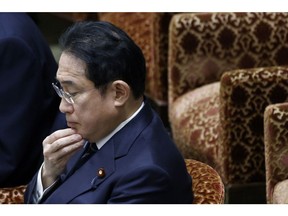Article content
(Bloomberg) — Japanese Prime Minister Fumio Kishida heads to Washington looking to strengthen his country’s alliance with the US while sidestepping issues that cast their ties in an unfavorable light — including the planned takeover of United States Steel Corp.
President Joe Biden last month voiced opposition to Nippon Steel Corp.’s $14 billion-plus plan to buy the US steelmaker, a rare intervention even if he has not directly pledged to block it. While that places him alongside union workers in a critical election year, it runs the risk of upsetting one of Washington’s strongest allies in Asia.
Article content
The Japanese government has refrained from commenting substantively on the deal, and Kishida has said he doesn’t plan to discuss it at a summit with Biden this week. Yet the case illustrates the uneasy position many US allies have been left in as Biden prepares for a rematch with his predecessor Donald Trump in November’s presidential election.
The US has repeatedly asked partners like Japan to restrict China’s access to cutting-edge technology and called for cooperation to counter Beijing’s efforts to claim vast areas of the South China Sea. Washington also wants its allies to roll out more job-creating investment in the US, without offering much new in return.
Kishida, whose voter support has slumped to record lows in recent months, is keen to play along and avert the public gaze from problematic areas in the relationship. The prime minister will instead try to keep the limelight on areas of agreement.
“Japan and the US are global partners taking a lead together on various international problems,” Kishida told reporters Monday before departing for Washington. “I want to confirm that Japan-US relations are even more solid than ever and this is an extremely important opportunity to convey that to the world.”
Article content
Read more: Japan’s Kishida Advocates Wider Defense Network Ahead of US Trip
There may be business logic too. Portraying the steel deal as simply a matter between two private companies gives the takeover a better chance of staying alive, according to people familiar with the matter.
“Japan won’t make this a political issue and the Japanese government won’t comment on it,” said Akira Amari, a ruling party heavyweight and former minister known for his industrial policy expertise. “This deal would be a symbol of Japan-US cooperation as allies because we would be able to confront China’s rising technological capability.”
Chinese state media, meanwhile, have made the most of the cracks, pointing out that US aversion to the takeover sits awkwardly with its complaints over Beijing.
“For a long time the US has painted itself as a defender of free trade and pointed an accusing finger at China for not allowing wider market access and providing a level playing field for foreign investors,” the China Daily said, describing the US as the biggest threat to economic globalization.
Article content
“Yet the Nippon Steel merger, as well as a slew of restrictive policies that have been introduced to crack down on Chinese high-tech companies such as Huawei and TikTok, belie Washington’s claim,” the English-language paper said.
Biden’s motivation is clear. He needs to gain an edge over Trump, and he’ll do what he perceives as helping his chances, whether it be backing the United Steelworkers’ union opposition to the steel merger, or burnishing his green credentials over LNG.
“This has been a bitter lesson for Japanese government and business,” said Ken Weinstein, the Japan chair at the right-leaning Hudson Institute. Japanese businesses will think “about the role election-year politics plays in investment strategies.”
The consequences of the US election will also play out in gas. A US moratorium on liquefied natural gas export facilities bankrolled by Japanese companies came as a surprise to Japan’s top importers. The freezing of licences for new export plants comes in addition to tougher sanctions on a Russian Arctic LNG project vital to Tokyo.
The risk is not insignificant. The rise of the US as the world’s top LNG exporter wouldn’t have materialized without decades-spanning commitments from Japanese utilities and trading houses to purchase the fuel in the wake of the shale revolution.
Japan’s government in that case has taken a public stance, saying that it was concerned about the decision and that the nation will take steps to secure its energy needs — an unusually strong statement from a key partner.
Democratic Senator Joe Manchin spoke of the uncertainty over energy in Houston last month: “It’s just a curveball that scares the bejesus out of our allies.”
—With assistance from Ruth Liao, Jennifer A. Dlouhy, Joe Deaux and Isabel Reynolds.
Share this article in your social network

Comments